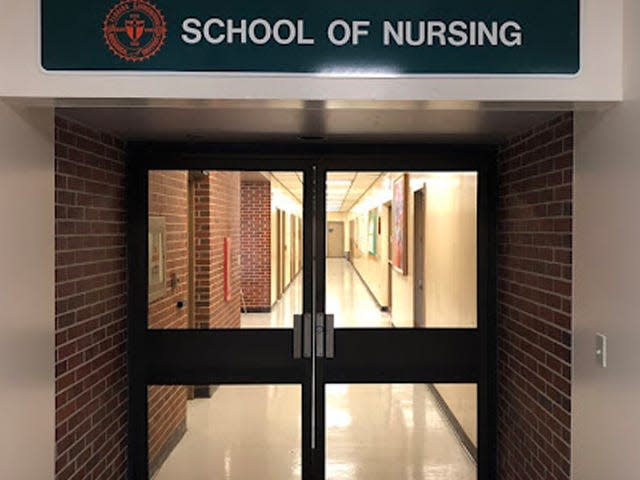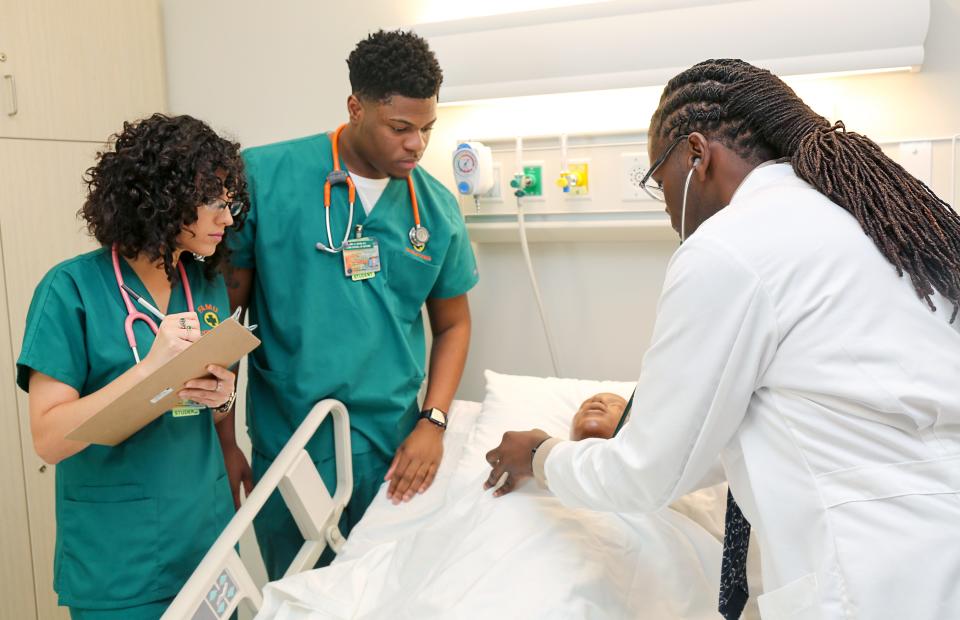How Florida A&M University aims to fill the gap during nationwide nurse shortage
The nation’s nursing shortage is hitting close to home in Florida.
With the overwhelming demand for nurse candidates, Florida A&M University is responding by expanding its nursing program with three new degree tracks.
FAMU President Larry Robinson announced last week the university will be adding Nursing Informatics, Nursing Leadership and Nursing Education degree options to its Master of Science in Nursing (MSN) program. The new specializations will begin in January.
More: Leon County jobs: A by-the-numbers look at the workforce landscape

According to Avant Healthcare Professionals, there were over 20,000 vacant nurse positions across the state as of April, and Florida can expect to face a shortage of more than 59,000 nurses by 2035.
"Our MSN program is extremely important because we need nurses for Florida at the master's level to be able to educate more nurses, and our program will be able to do that,” FAMU Dean and Professor of Nursing Shelley Johnson said. “Plus, we'll be able to provide the care in the community that patients need from these nurse practitioners that we prepare.”

On average, FAMU's School of Nursing produces over 80 bachelor's and master's level nursing graduates each year. The majority of the BSN and MSN students get their first jobs post-graduation in Florida, according to Johnson.
The three tracks will be offered online and are being developed in partnership with Wiley's University Services. Wiley is one of the world's leading companies in publishing, education and research that partners with universities to deliver online degree programs. Its division of University Services provides colleges with textbooks, skill training and clinical placement services.
The start-up cost associated with getting the new master's concentrations online is over $300,000 paid to Wiley, said FAMU Associate Provost for Faculty Affairs and Academic Initiatives Genyne Boston.

The online master's program in nursing at FAMU added specializations in Women’s Health, and in Adult Gerontology, in 2021. Both are in partnership with Wiley.
The online master's concentrations are exceeding enrollment expectations.
“Our goal for the year was to have 30 students enrolled in this (online master's) program, and we are already at that target," Johnson said. “We're really excited that Wiley was able to come in and help us. We were thinking that we would have 15 students and then double to 30, but we're starting with 30 and we'll see what happens in this group.”

While the online master's programs are generating success, the school's undergraduate degree program remains under scrutiny after being placed on probation in 2021 by the state’s Board of Nursing for having low first-time passing rates.
Johnson said the BSN program remains on probation, although first-time license pass rates have recently improved.
FAMU nursing students had a first-time National Council Licensure Examination (NCLEX) pass rate of 63.44% in 2019, 66.67% in 2020 and 62.30% in 2021. The program's 2022 mid-year pass rate increased to 74.29% while it works toward the goal of 80%. The national pass rate is 86% for 2022.
Related: FAMU School of Nursing placed on probation by state board, accreditation maintained

FSU, TCC increase nursing student enrollments
Florida State University and Tallahassee Community College are also responding to the demand with their own expanded programming.
FSU increased its College of Nursing undergraduate enrollment by expanding admissions this spring from once per year to three times per year, allowing students to now be accepted to the bachelor of science nursing program in the fall, spring, and summer semesters.
The first summer cohort was admitted in June, and the program will have 325 enrolled undergraduate students this fall compared to 216 last fall.
Approximately 75 undergraduate students graduate each spring with their degree in nursing, and more are expected to graduate each year with the increased enrollment cycles. FSU's latest NCLEX test scores show a pass rate of 92.23% in 2021.

Other news: FSU and TMH aim to make Tallahassee a leader in medical research
Changes were also made to the College of Nursing's admissions criteria, where the minimum GPA requirement was decreased from a 3.4 to a 3.0 and the minimum grade requirements for prerequisite courses went from a grade of B or better to a grade of C or better.
"To allow more students to access our program and to help offset the nursing shortage, we looked at the state requirements for all the other schools and tried to put ours more in alignment with theirs," said Marsha Hartline, Interim Assistant Dean for Student Services at the College of Nursing. "Both of these changes are more in line with other competitor schools across the state, including UF and UCF."

TCC is also boosting the number of students entering their nursing program with plans of doubling the size from 76 students to 130 this fall.
The increase in students comes along with more instructors. So far, five nursing faculty have been hired for the fall to add on to TCC's current 14 nursing instructors, and officials are looking to get additional faculty on board for the program.
More: Bank of America awards $250,000 to TCC to establish medical lab tech program
TCC received over $825,000 from the state legislature to cover the cost of faculty and a new simulation center, which will open this fall at the college's Ghazvini Center for Healthcare Education.
"Anytime we double the number of students, we have to double the number of faculty and simulation space," TCC Provost and Vice President of Academic Affairs Calandra Stringer said. "We want all of our nursing students to have the opportunity to practice."
Contact Tarah Jean at tjean@tallahassee.com or follow her on Twitter @tarahjean_.
Never miss a story: Subscribe to the Tallahassee Democrat using the link at the top of the page.
This article originally appeared on Tallahassee Democrat: FAMU's new degree tracks expand its nursing program

